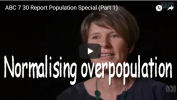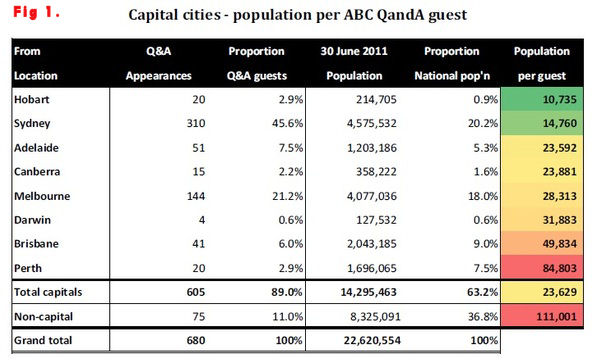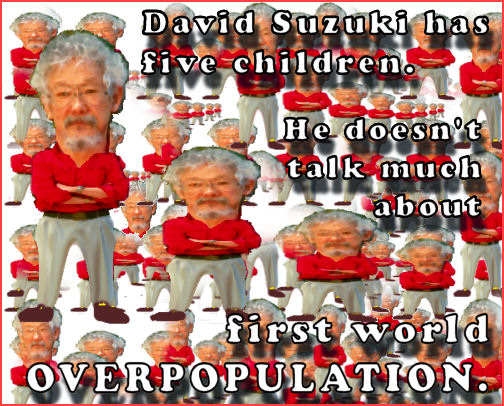
Take a look at the One Child Policy nonsense at the Australian Democracy Museum site! Today Candobetter.net received a communication from the Australian Museum of Democracy. At first we thought that a bunch of Australian revolutionaries with a sense of humour had contacted us and we immediately went to their website, as they advised us to, to comment. We were disappointed to realize that this is just another face of Australian government propaganda and the Growth Lobby is well-ensconced. The website belongs to the Australian Museum of Democracy, which is owned and financed by taxpayers, but controlled by the government. So, what do you find when you go and make that visit to the website to “have your say” about democracy as encouraged? Update 5 Aug 2011: My comment now published on democracy site.

Today Candobetter.net received a communication from the Australian Museum of Democracy. At first we thought that a bunch of Australian revolutionaries with a sense of humour had contacted us and we immediately went to their website, as they advised us to, to comment.
We were disappointed to realize that this is just another face of Australian government propaganda. The website belongs to the Australian Museum of Democracy, which is owned and financed by taxpayers, but controlled by the government.
So, what do you find when you go and make that visit to the website to “have your say” about democracy as encouraged?
Well, firstly, you find that the site promotes Australian democracy as a given. Secondly, if you try to post, you will discover that democratic speech is moderated at the Museum of Democracy. Thirdly, it purports to educate us about the value of this so-called democracy by evoking four different indicators of what it calls undemocratic governments. The indicators are: Curfews, Prevention of Public Assembly, One Child Policies, and National Identity Cards. Australians are supposed to congratulate themselves that the government apparently doesn't impose these policies. Hmm, and we also don't have public floggings and women are allowed to go to school, so everything in the garden of democracy in Oz is lovely - not!
Enough with the spin, already.
1. Curfews.
Okaaay, so we are still allowed to stay up late and catch scarily neglected public transport home (if there is any).
2. One Child Policies.
We don’t have such policies, yet. But we are working on it with our big population policy. We are currently free to have lots of children, but who has the time or money when we are all working to pay huge rents and mortgages as the cost of living skyrockets due to that big population policy we all hate that’s supposed to make us all rich.
3. Prevention of public assembly.
Then again, there is no civil right to public assembly. If someone threatens you with violence for holding a meeting, they have to actually hurt you before the police will step in. It is actually illegal to hold a democratic protest in many places in Australia because public space has become privately owned. Joe Toscano tries to educate people about this scandalous abrogation of democracy again and again. Check out his podcasts on 3CR. And, if you want to meet in city square or one of those big malls that have replaced normal town centers and streets, you need permission, and you will have to say who will take responsibility for the gathering.
4. National Identity cards
Yes, well, all you have to do is go to the bank and your movements are electronically traceable. You don’t even have the choice of receiving your wages in cash these days. You HAVE TO have an electronic footprint. This isn’t freedom. (The popularization of mobile phones and the lack of public phones is another traceable consumer-trap, not to mention facebook, which more and more people are conditioned to bare their soles on – but you are not forced to engage with these.)
Australia's poor record on Human Rights and even worse on Civil Rights (Democracy)
Australia recently held, with much fanfare, a “National Human Rights Consultation,” overseen by a Catholic priest with a strong commitment to communitarianism, questionably famous for his involvement in Aboriginal communities, and with little interest in civil rights. The outcome consisted of, to paraphrase the Attorney General, “reaffirming a commitment to our human rights obligations; the importance of human rights education; enhancing our domestic and international engagement on human rights issues; improving human rights protections, including through greater parliamentary scrutiny [by Murdoch-controlled parliament, sure]; and achieving greater respectfor human rights principles within the community.
The Attorney General went on to say, apparently without any conscious irony, that “A legislative charter of rights was not included in the Framework as “the Government believes that the enhancement of human rights should be done in a way that, as far as possible, unites rather than divides our community.” !
My submission to the Democracy Museum awaiting moderation - now published

Under “One Child Policies,” in response to “Population control is not an issue in Australia and no attempts are made by government to limit births—in fact they are encouraged!”at 13.55 today, August 3, 2011, I placed the following comment. At 21.09 the same day it was still “awaiting moderation.” On 5 August I saw that it was published. Nonetheless, moderation is a fraught concept on a democracy blog and there should be some explanation at the democracy page, for instance, that they will publish anything except stuff that breaks the laws, including material that is critical of laws.
I wrote,
Thank you for your democracy initiative. I edit an Australian website for reform in democracy, environment, population, land use planning and energy policy. It is at http://candobetter.net
Your claim that “Population control is not an issue in Australia…” is false. It is a major failure of democracy in Australia that the government, at state and federal levels, is artificially stimulating population growth upwards by forcing high levels of immigration on Australians against the small amounts of protest our defective ‘democratic’ system affords and polls which show over 70% of people are against this. It is clear that the major movers of this undemocratic population control policy are corporate members of the Growth Lobby, who have financial interests in growth (notably in property development and allied industries) and that they find support from the corporate and public media, the ALP and the Liberal Party. I wrote my research thesis in environment and population sociology on this and it has been strikingly predictive. You may find it at The Growth Lobby in Australia and its Absence in France. There are many women fighting Australia’s growthist policies. You might like to promote some of my articles about Australian activists against growth and its impacts, particularly this one about how women lead democratic actions in Victoria, Australia against an undemocratic parliament: “Anti-Growth Lobby: Women in politics: why don’t more participate – or do they? (Melbourne, Australia)” At http://candobetter.net we have a whole page assigned to democracy: http://candobetter.net/taxonomy/term/13.
There are also many other policies in Australia – and laws – which are in place – such as the laws on terrorism – which are dangerous to freedom.
The official democracy blurb
Here is what is being sent round by the Museum of Australian Democracy:
“Have your say day August 10th 2011
“A recent survey conducted by the Museum of Australian Democracy shows that two thirds of Australians say they don’t understand the relevance of democracy to their everyday lives, even though we live with it everyday – from our own personal values, to the way we interact with our family and our local community, down to the choices we are free to make.
These are freedoms enjoyed by citizens of a democracy.
That’s why on Wednesday August 10 the Museum of Australian Democracy is holding a “Have Your Say Day”.
On “Have Your Say Day” we want to encourage all Australians to speak out and be a part of democracy.
How can you participate in “Have Your Say Day”
We want you to share with our nation, what you love about the freedom of our country and importantly, discuss an issue you feel passionate about.
Below are 10 steps on how you can get involved in “Have Your Say Day”:
1. Contribute to the “Have Your Say Day” dialogue by visiting www.ourfreedom.com.au
2. Join a group with a cause
3. Tweet about it using #moadhaveyoursayday to join the conversation
4. Find out who your Member of Parliament is at the Australian Electoral Commission website: http://www.aec.gov.au
5. Go to your favourite newspaper’s website and make a comment about a news story, or write a letter to the Editor
6. Start a blog of your own or participate in a blog or forum online
7. Call a talkback radio station and voice your opinion
8. Discuss democracy or some of the issues in today’s news with your family and friends – what are their thoughts and opinions?
9 Post a note in your Facebook status or create your own Facebook poll
10. Post a video to YouTube and tag it “Have Your Say Day” and encourage your friends to do the same.
You can also take a visit to your state’s parliament, or come and visit the Museum of Australian Democracy at Old Parliament House in Canberra – www.moadoph.gov.au
For more information on “Have Your Say Day” – visit www.ourfreedom.com.au
Try it.
For their media contacts the Democracy Museum of Australia lists a commercial company, Fenton Communications, which is a slick ‘cause’ marketer to and for the mainstream.
The Museum of Democracy, in its Annual Report for 2009-2010, included among their “Key performance indicators” to “Increase awareness of the new role of OPH as a museum exploring the past, present and future of Australian democracy” and to “Be acknowledged as a pre-eminent and innovative cultural institution” and to “Extend OPH’s profile and partnerships with other institutions, academics and cultural innovators.”
So, Australians, let this Museum know you are out there and that you expect more, much more of an institution purporting to represent your voices.
NOTES
For the record, when I first published this article, I was very critical of the moderation and failure to promptly publish my comment about the one child policy. I feared that it would not be published, however it now has been, so I do eat my words and pay my respects to the democracy blog, even though I still regard the examples it gives as indicative of growth-lobby bias. At least I was able to criticise this.
So, for the record: I had written:
"As I said,
Under “One Child Policies,” in response to “Population control is not an issue in Australia and no attempts are made by government to limit births—in fact they are encouraged!”at 13.55 today, August 3, 2011, I placed the following comment. At 21.09 the same day it was still “awaiting moderation.”
I wrote,
Thank you for your democracy initiative. I edit an Australian website for reform in democracy, environment, population, land use planning and energy policy. It is at http://candobetter.net
Your claim that “Population control is not an issue in Australia…” is false. It is a major failure of democracy in Australia that the government, at state and federal levels, is artificially stimulating population growth upwards by forcing high levels of immigration on Australians against the small amounts of protest our defective ‘democratic’ system affords and polls which show over 70% of people are against this. It is clear that the major movers of this undemocratic population control policy are corporate members of the Growth Lobby, who have financial interests in growth (notably in property development and allied industries) and that they find support from the corporate and public media, the ALP and the Liberal Party. I wrote my research thesis in environment and population sociology on this and it has been strikingly predictive. You may find it at The Growth Lobby in Australia and its Absence in France. There are many women fighting Australia’s growthist policies. You might like to promote some of my articles about Australian activists against growth and its impacts, particularly this one about how women lead democratic actions in Victoria, Australia against an undemocratic parliament: “Anti-Growth Lobby: Women in politics: why don’t more participate – or do they? (Melbourne, Australia)” At http://candobetter.net we have a whole page assigned to democracy: http://candobetter.net/taxonomy/term/13.
There are also many other policies in Australia – and laws – which are in place – such as the laws on terrorism – which are dangerous to freedom.
 Oh, I get it, this is the museum of moderated democracy.
Oh, I get it, this is the museum of moderated democracy.
 I knew it was my lucky day. Returning home from a walk this afternoon I removed the clutter of advertising material from my letter box. A rather subdued, tasteful card caught my eye as I shuffled through the assortment of catalogues and lost kitten notices. I noted the heading on a sage green coloured card - "Halcyon Close" - featuring a double storey, apparently newly built, modern styled townhouse complex. The verso showed the interior and outdoor living areas of one of these hallowed retreats, the living room suffused with light through floor- to -ceiling windows, onto neutral-coloured walls and soft furnishings, the outdoor living area dappled with sunlight, through a hint of greenery, on a neutral-tiled patio and beige outdoor furniture.
I knew it was my lucky day. Returning home from a walk this afternoon I removed the clutter of advertising material from my letter box. A rather subdued, tasteful card caught my eye as I shuffled through the assortment of catalogues and lost kitten notices. I noted the heading on a sage green coloured card - "Halcyon Close" - featuring a double storey, apparently newly built, modern styled townhouse complex. The verso showed the interior and outdoor living areas of one of these hallowed retreats, the living room suffused with light through floor- to -ceiling windows, onto neutral-coloured walls and soft furnishings, the outdoor living area dappled with sunlight, through a hint of greenery, on a neutral-tiled patio and beige outdoor furniture. 

 Dear Censorial Overseers
Dear Censorial Overseers
 ABC 7.30 Report last night aired part one of its three-part population special, which included me as the economist. While I will reserve judgement until the final two-parts have been aired, my initial gut reaction is disappointment. The main problem I see with it so far is the ABC has inferred that a population of more than 40-million mid-century is inevitable rather than a direct policy choice. Nowhere did The ABC clearly show how the federal government massively increased Australia’s immigration intake from the early-2000
ABC 7.30 Report last night aired part one of its three-part population special, which included me as the economist. While I will reserve judgement until the final two-parts have been aired, my initial gut reaction is disappointment. The main problem I see with it so far is the ABC has inferred that a population of more than 40-million mid-century is inevitable rather than a direct policy choice. Nowhere did The ABC clearly show how the federal government massively increased Australia’s immigration intake from the early-2000 





 How did stealing from the public to enrich the private sector become a norm in Australia and why do some religions give it moral credence? This is a reminder of the existence of an important, publicly available article about the rise of right-wing so-called 'think tanks' in Australia since the mid 1970s and their recent tendency to combine forces with the religious right. Here, from another source and angle, are arguments that reinforce candobetter's message about the problems Australia has with the growth lobby and its merchants.
How did stealing from the public to enrich the private sector become a norm in Australia and why do some religions give it moral credence? This is a reminder of the existence of an important, publicly available article about the rise of right-wing so-called 'think tanks' in Australia since the mid 1970s and their recent tendency to combine forces with the religious right. Here, from another source and angle, are arguments that reinforce candobetter's message about the problems Australia has with the growth lobby and its merchants. The authors identify a 'pivotal shift' around 1980 when Sir Robert Crichton-Brown[1] led a political campaign to make business more pro-active in policy making processes and public debate, apparently with the aim of bolstering a privileged minority.
The authors identify a 'pivotal shift' around 1980 when Sir Robert Crichton-Brown[1] led a political campaign to make business more pro-active in policy making processes and public debate, apparently with the aim of bolstering a privileged minority.  Significantly preceding this campaign were visits to Australia in 1975 and 1976 of ultra-economic rationalists, Milton Friedman and
Significantly preceding this campaign were visits to Australia in 1975 and 1976 of ultra-economic rationalists, Milton Friedman and 
 During the high immigration Howard era- the fuss about the boats was a smokescreen for the fact that we were getting a lot of extra government induced totally legal non- refugee immigration which was putting pressure on absolutely everything- environment, roads, housing etc. . Howard was a high population PM whist pretending to be jealously protecting Australia’s borders. This hypocrisy and the same game still goes on with Julia Gillard although without “children overboard”.
During the high immigration Howard era- the fuss about the boats was a smokescreen for the fact that we were getting a lot of extra government induced totally legal non- refugee immigration which was putting pressure on absolutely everything- environment, roads, housing etc. . Howard was a high population PM whist pretending to be jealously protecting Australia’s borders. This hypocrisy and the same game still goes on with Julia Gillard although without “children overboard”.
 Back in 2002 the Australian Government owned Australian Broadcasting Corporation (ABC) surprisingly placed itself in the
Back in 2002 the Australian Government owned Australian Broadcasting Corporation (ABC) surprisingly placed itself in the 
 Victorian Planning Minister Matthew Guy is setting up a website
Victorian Planning Minister Matthew Guy is setting up a website 
 The producers of Q and A have their favourites when it comes to “thinktanks”, with the free marketeering IPA topping the list with 4 different panellists and 11 appearances in total (not including appearances by former staff members). Meanwhile, prominent progressive think tank The Australia Institute has never featured on Q&A, despite TAI’s current head Dr Richard Denniss debating Lord Christopher Monckton about climate change at the National Press Club last year and its former head being prominent author and intellectual Professor Clive Hamilton.`````
The producers of Q and A have their favourites when it comes to “thinktanks”, with the free marketeering IPA topping the list with 4 different panellists and 11 appearances in total (not including appearances by former staff members). Meanwhile, prominent progressive think tank The Australia Institute has never featured on Q&A, despite TAI’s current head Dr Richard Denniss debating Lord Christopher Monckton about climate change at the National Press Club last year and its former head being prominent author and intellectual Professor Clive Hamilton.`````


 October 31st, 2011, was a "teachable" moment, one of those moments that come so infrequently that they must therefore be seized and exploited to the fullest extent to increase public awareness. That was the day that, according to demographers, we reached an awful milestone, the day that our species became 7 billion in number. If you expected David Suzuki to use that event to highlight the problem of overpopulation, your expectations would have been cruelly dashed. Dr. Suzuki instead chose to spout the Monbiot line. Overpopulation is not the problem, you see. Its overconsumption by you know who.
October 31st, 2011, was a "teachable" moment, one of those moments that come so infrequently that they must therefore be seized and exploited to the fullest extent to increase public awareness. That was the day that, according to demographers, we reached an awful milestone, the day that our species became 7 billion in number. If you expected David Suzuki to use that event to highlight the problem of overpopulation, your expectations would have been cruelly dashed. Dr. Suzuki instead chose to spout the Monbiot line. Overpopulation is not the problem, you see. Its overconsumption by you know who.


 The way The Australian writes him up, Tim Flannery, who once wrote so articulately in defense of our land and its ecology and our place in it, now seems reduced to a quasi-apologist for extreme mining technologies. The Australian writes in such an unbalanced way. See also
The way The Australian writes him up, Tim Flannery, who once wrote so articulately in defense of our land and its ecology and our place in it, now seems reduced to a quasi-apologist for extreme mining technologies. The Australian writes in such an unbalanced way. See also  Your ABC will be giving yet more air-space to commercial growth lobbyists who will be spruiking at the Wheeler Center tonight. Publicity for the event actually claims that high density living is "great for the environment." In fact, the Australian Conservation Foundation's Consumption Atlas shows that greenhouse gas emissions of those living in high-density areas are greater than for those living in low-density areas. An analysis of the data shows that the average carbon dioxide equivalent emission of the high-density core areas of Australian cities is 27.9 tons per person whereas that for the low-density outer areas is 17.5 tons per person. (Free Event TONIGHT 12 OCT 2011.)
Your ABC will be giving yet more air-space to commercial growth lobbyists who will be spruiking at the Wheeler Center tonight. Publicity for the event actually claims that high density living is "great for the environment." In fact, the Australian Conservation Foundation's Consumption Atlas shows that greenhouse gas emissions of those living in high-density areas are greater than for those living in low-density areas. An analysis of the data shows that the average carbon dioxide equivalent emission of the high-density core areas of Australian cities is 27.9 tons per person whereas that for the low-density outer areas is 17.5 tons per person. (Free Event TONIGHT 12 OCT 2011.)
 Participants were shocked recently to hear Ms Prue Digby, Deputy Secretary, Planning and Local Government, Department of Planning and Community Development include in her paper on "housing a growing population" a section on "eliminating the NIMBY culture" at the Informa Australia "Population Australia - 2050 Summit." Article by Julianne Bell.
Participants were shocked recently to hear Ms Prue Digby, Deputy Secretary, Planning and Local Government, Department of Planning and Community Development include in her paper on "housing a growing population" a section on "eliminating the NIMBY culture" at the Informa Australia "Population Australia - 2050 Summit." Article by Julianne Bell.



 Oh, I get it, this is the museum of moderated democracy.
Oh, I get it, this is the museum of moderated democracy. The Canadian federal election cries out for an alternative to BAU growthism. It cries out for a party which would present a coherent and distinctive alternative to the system of economic growth. Canadians need a place on the ballot where they can mark an "X" beside "no more growth". In fact they need an opportunity for vote for "de-growth". But the Green Party of Canada is not providing them with that opportunity or alternative. Instead, what they are providing is meaningless rhetoric and platitudes. Shall we lend credence to their approach by voting for them? Shall we allow them to say that they have our support for their direction? Shall we allow them to say, after receiving our vote, that they have a mandate to push for hyper immigration and a foreign aid policy that would continue to promote global overpopulation? I say no. I say that casting a vote can sometimes be worse than spoiling a ballot. There are many things one can do to promote change that voting in a sham election. Writing, petitioning, demonstrating and educating the grassroots come to mind.
The Canadian federal election cries out for an alternative to BAU growthism. It cries out for a party which would present a coherent and distinctive alternative to the system of economic growth. Canadians need a place on the ballot where they can mark an "X" beside "no more growth". In fact they need an opportunity for vote for "de-growth". But the Green Party of Canada is not providing them with that opportunity or alternative. Instead, what they are providing is meaningless rhetoric and platitudes. Shall we lend credence to their approach by voting for them? Shall we allow them to say that they have our support for their direction? Shall we allow them to say, after receiving our vote, that they have a mandate to push for hyper immigration and a foreign aid policy that would continue to promote global overpopulation? I say no. I say that casting a vote can sometimes be worse than spoiling a ballot. There are many things one can do to promote change that voting in a sham election. Writing, petitioning, demonstrating and educating the grassroots come to mind. The Canadian federal election is upon us and the Green Party claims to offer a "significantly different approach to governance" (see below). Really? Let's take a look:
The Canadian federal election is upon us and the Green Party claims to offer a "significantly different approach to governance" (see below). Really? Let's take a look: Neither The BC Liberals Nor the NDP Will Question The Population Growth Which Drives Energy Consumption
Neither The BC Liberals Nor the NDP Will Question The Population Growth Which Drives Energy Consumption

Recent comments